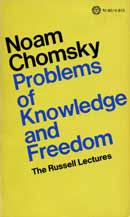
Problems of Knowledge and Freedom
The Russell Lectures
Chomsky, Noam
Publisher: Vintage, New York, USA
Year First Published: 1971
Year Published: 1972
Pages: 113pp ISBN: 0-394-71815-1
Library of Congress Number: P106.C53 1972 Dewey: 121
Resource Type: Book
Cx Number: CX6509
These lectures explore Bertrand Russell's work on empiricism, morality, linguistics and politics.
Abstract:
This book is a tribute to the thinking of philosopher Bertrand Russell. It is based on the lectures delivered at Trinity College, Cambridge in 1971. These lectures explored Russell's work on empiricism, morality, linguistics and politics. Russell used his conclusions regarding the development of language to construct his empirical theory. There is a connection between how humans obtain knowledge and how they develop systems of language to describe their discoveries.
Chomsky's lectures described Russell's hope for "a radical transformation of the advanced industrial societies of the West to some form of libertarian socialism". They allowed Chomsky to introduce his own opinions. He applies his theories on the acquisition of knowledge to then-current issues, such as America's war against Vietnam.
The book is divided into two parts. Part 1, On Interpreting the World, is a synthesis of Chomsky and Russell's empirical principles of human understanding, based on their discoveries in linguistics. These principles are applied in Part 2, On Changing the World. Chomsky analyzes the politic happenings of the twentieth century and describes how his conclusions about knowledge provide answers to the problem of freedom.
This work is slightly revised from the original lectures. It provides direct quotations from Bertrand Russell and an overview of his work. It is preceded by an introduction of the purpose of this compilation, as well as Chomsky's personal thoughts on Russell.
[Abstract by Mia Manns]
Table of Contents
Introduction
Chapter 1: On Interpreting the World
Chapter 2: On Changing the World
Subject Headings


